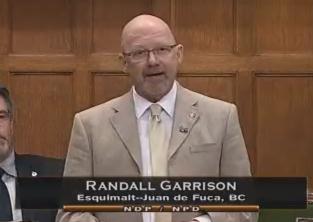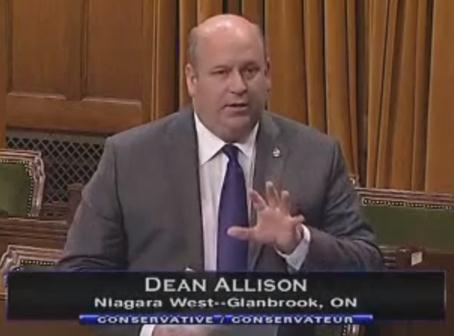
NDP MP Randall Garrison submitted Bill C-279, which would add gender identity and gener expression to the Canadian Human Rights Act and Criminal Code. Credit: Screencap
On April 5, during the second reading debate for trans rights Bill C-279 in the House of Commons, Conservative MP Dean Allison said the bill would give “special rights” to “sexual predators” caught lurking in women’s washrooms.
NDP MP Randall Garrison, who submitted the bill, blasted Allison’s comments as “a throwback to some other decade.”
Allison, who did not reply to Xtra’s request for comment, said the bill should not pass because there is still a societal concern that transgender people are a risk to the public.
If passed, Garrison’s private member’s bill would add gender identity and gender expression to the list of statuses protected under the Canadian Human Rights Act and would amend the Criminal Code to include anti-transgender violence, assault and harassment.
This is not the first time Conservatives have tried to link the bill with “bathrooms” and pedophilia. Its predecessor, Bill C-389, received negative media attention after it was dubbed “the bathroom bill” by evangelical lobbyist Charles McVety.
The bill would give transitioning women “access to girls’ bathrooms,” Allison declared in the House of Commons. “As the bill would also give special rights to those who simply consider themselves to be transgendered, the door would be open to sexual predators having a legal defence to charges of being caught in a women’s washroom or locker room.
“As sexual predators are statistically almost always men, imagine the trauma that a young girl would face, going into a washroom or a changeroom at a public pool and finding a man there,” he warned.
The Trans Lobby Group’s Christin Milloy, who was watching and tweeting the debate from Toronto, says she was offended and disturbed by Allison’s comments, which she says perpetuate a myth about trans people that is intentionally frightening and misleading. “What the Conservatives are doing is fear-mongering. They are playing to the stereotype that trans people are just men disguised as women. This is damaging and this is harmful.”
Garrison says not all Conservative MPs feel that way. “That’s at the core of the old Reform Party attitude that I think is a significant part of the Conservative caucus, but there are others who don’t share those views.” He says there are 65 sitting members who voted against same-sex marriage. “That gives you an idea.”
Garrison says he is more interested in comments from Conservative MP Kerry-Lynne Findlay, parliamentary secretary to the minister of justice, who says the terms “gender identity” and “gender expression” require a definition.
Findlay said the proposed changes “as drafted” are “simply not necessary,” because the Canadian Human Rights Act already prohibits discrimination on the grounds of sex. “There are already the necessary legal protections in place to protect transsexuals,” she said.
Findlay said the terms would add “vagueness” to the law: “I am particularly concerned with the unclear term ‘gender expression’ . . . What new discrimination claims will be brought before the commission and the tribunal?”
“How can we ask tribunals and courts to apply something that we as legislators do not clearly understand? The fact that we have no idea how tribunals and courts would interpret these terms is also an issue we should consider,” Findlay added.
Garrison, who plans to meet with Findlay as soon as possible, says she opened the door for a possible amendment to the bill — definitions for the terms “gender identity” and “gender expression.”
“She wants definitions,” Garrison says. “There are some good arguments to not include definitions. Nowhere in the legislation do we define sex or race. But I’m still willing to talk to her about it, if that’s what it takes to get the bill to committee.”
Garrison says retired MP Bill Siksay, who championed the original trans right bill, did not support providing definitions for the terms. “Are we going to write definitions for all things listed? I don’t think so.”
Milloy is open to adding definitions. “I don’t think it would be harmful to add definitions, but I don’t think it’s entirely necessary. I would prefer the definitions be left up to jurisprudence. The primary purpose of the bill is to establish that it’s not acceptable to discriminate based on gender identity.”
The most important thing now, Garrison says, is for groups and individuals that support the bill to contact their MPs and let them know, preferrably in person.
The bill returns to the House for a second debate and vote in about six weeks.
See Conservative MP Dean Allison’s comments:
See NDP MP Randall Garrison’s speech:
See Conservative MP Kerry-Lynne Findlay’s response:

 Why you can trust Xtra
Why you can trust Xtra


